Our Heroes
Inland Southern California has a rich civil rights history. The Walk of Fame honors some of the civil rights advocates who have lived or worked in Inland Southern California for their regional, statewide, national, or international impact on civil rights issues. These individuals are memorialized by underwriters who have sponsored their inclusion on the walkway around the Civil Rights Institute. A digital version of the Walk of Fame is also under development.
Future additions to the Walk of Fame will be evaluated by the Civil Rights Institute of Inland Southern California Board of Directors every two years. You can nominate and sponsor a civil rights hero by downloading a PDF of the application form here or completing the online form here.
Santos Manuel
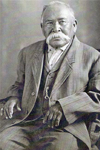 Santos Manuel was a Yuhaaviatam clan leader who defended the lives of his family—the indigenous people of the greater San Bernardino area—against a local militia seeking to remove all Native peoples in the region via murder and enslavement. The Native sovereign nation of the San Manuel Band of Mission Indians is named in his honor for his courageous and wise leadership.
Santos Manuel was a Yuhaaviatam clan leader who defended the lives of his family—the indigenous people of the greater San Bernardino area—against a local militia seeking to remove all Native peoples in the region via murder and enslavement. The Native sovereign nation of the San Manuel Band of Mission Indians is named in his honor for his courageous and wise leadership.
John W. North
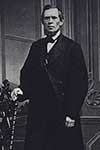 An active abolitionist, John W. North was one of a group sent to inform Abraham Lincoln of his nomination for president. He founded Riverside as a community based on equality, education, and shared opportunity.
An active abolitionist, John W. North was one of a group sent to inform Abraham Lincoln of his nomination for president. He founded Riverside as a community based on equality, education, and shared opportunity.
Eliza Tibbets
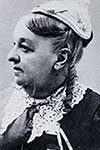 In 1871, Eliza Tibbets was one of a group of 70 women, accompanied by Frederick Douglass, who tried to register and vote under a new law that enfranchised citizens in Washington D.C. They sued and their test cases were heard in the Supreme Court of the District of Columbia. Eliza went on to foster the parent navel orange trees that started the region’s citrus industry.
In 1871, Eliza Tibbets was one of a group of 70 women, accompanied by Frederick Douglass, who tried to register and vote under a new law that enfranchised citizens in Washington D.C. They sued and their test cases were heard in the Supreme Court of the District of Columbia. Eliza went on to foster the parent navel orange trees that started the region’s citrus industry.
Dosan Ahn Chang Ho
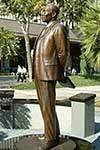 A humble orange picker who came to Riverside’s Pachappa settlement in 1904, Dosan sought to unify Korean labor in common cause. At a time of Asian exclusion in the U.S. and Japanese colonial occupation in Korea, he led the Korean independence movement as chair of the Korean National Association in North America and acting premier of the Korean Provisional Government in Shanghai. He died in Japanese custody in 1938.
A humble orange picker who came to Riverside’s Pachappa settlement in 1904, Dosan sought to unify Korean labor in common cause. At a time of Asian exclusion in the U.S. and Japanese colonial occupation in Korea, he led the Korean independence movement as chair of the Korean National Association in North America and acting premier of the Korean Provisional Government in Shanghai. He died in Japanese custody in 1938.
Jukichi and Ken Harada
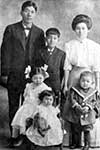 When the state of California used the Alien Land Law of 1913 to try to force them from the home bought in their children’s names, the Haradas fought back, challenging the law’s application to U.S.-born children of Asian immigrants. They won. The family’s Lemon Street home is a National Historic Landmark that embodies their 1918 victory.
When the state of California used the Alien Land Law of 1913 to try to force them from the home bought in their children’s names, the Haradas fought back, challenging the law’s application to U.S.-born children of Asian immigrants. They won. The family’s Lemon Street home is a National Historic Landmark that embodies their 1918 victory.
Buford Johnson
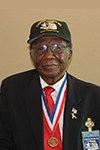 Johnson was a Master Sergeant in the 99th squadron of the 477th composite group, also known as the Tuskegee Airmen. He was the first African American jet mechanic in the United States Air Force, the first African American crew chief to work on jet aircraft, and the first African American to do so in a combat zone.
Johnson was a Master Sergeant in the 99th squadron of the 477th composite group, also known as the Tuskegee Airmen. He was the first African American jet mechanic in the United States Air Force, the first African American crew chief to work on jet aircraft, and the first African American to do so in a combat zone.
Mine Okubo
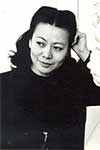 Japanese American artist anddocumentarian of life in a U.S.concentration camp during World War II, Miné Okubo is best known for her book, Citizen 13660. The 1946 publication of drawings and text is the first published depiction of an incarcerated person’s experience in the camps. In 1984, the work won the American Book Award.
Japanese American artist anddocumentarian of life in a U.S.concentration camp during World War II, Miné Okubo is best known for her book, Citizen 13660. The 1946 publication of drawings and text is the first published depiction of an incarcerated person’s experience in the camps. In 1984, the work won the American Book Award.
Barnett and Eleanor Jean Grier
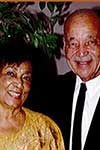 Dr. Barnett Grier and Eleanor Jean Grier, civil rights leaders, fought racial disparitiesand promoted equal opportunity. Barnett authored Trek to Equality, founded Habitat for Humanity Riverside, and was president of the NAACP. Jean was a pioneer educator, developed Riverside Head Start, and integration and gifted programs. Together they founded the UCR Concerned Citizens Committee.
Dr. Barnett Grier and Eleanor Jean Grier, civil rights leaders, fought racial disparitiesand promoted equal opportunity. Barnett authored Trek to Equality, founded Habitat for Humanity Riverside, and was president of the NAACP. Jean was a pioneer educator, developed Riverside Head Start, and integration and gifted programs. Together they founded the UCR Concerned Citizens Committee.
Dalip Singh Saund
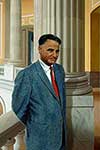 Dalip Singh Saund pursued a decades-long campaign for citizenship for people of South Asian descent and became a citizen in 1949 after the legislation he fought for passed. He was elected judge in 1952 and later ran for Congress, the first Asian American to be elected to Congress, winning a seat in the Inland region’s 29th District in 1956.Dalip Singh Saund came to study agriculture and while at UC Berkeley also obtained a masters and Ph.D. in mathematics. He campaigned for decades for the rights of people of South Asian descent to become naturalized citizens and when the Luce-Celler Act was finally passed in 1946, he applied for naturalization, becoming a citizen in 1949.
Dalip Singh Saund pursued a decades-long campaign for citizenship for people of South Asian descent and became a citizen in 1949 after the legislation he fought for passed. He was elected judge in 1952 and later ran for Congress, the first Asian American to be elected to Congress, winning a seat in the Inland region’s 29th District in 1956.Dalip Singh Saund came to study agriculture and while at UC Berkeley also obtained a masters and Ph.D. in mathematics. He campaigned for decades for the rights of people of South Asian descent to become naturalized citizens and when the Luce-Celler Act was finally passed in 1946, he applied for naturalization, becoming a citizen in 1949.
César Chávez
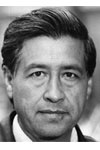 As a child, César and his family worked the crops and fields in California, experiencing unsafe working conditions and starvation wages that led him to found the National Farm Workers Association in 1962. It later merged with a Filipino group forming the United Farm Workers. Chávez’s efforts to protect farm workers are historic. An American hero!
As a child, César and his family worked the crops and fields in California, experiencing unsafe working conditions and starvation wages that led him to found the National Farm Workers Association in 1962. It later merged with a Filipino group forming the United Farm Workers. Chávez’s efforts to protect farm workers are historic. An American hero!
John Sotelo
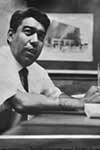 An Eastside businessman, he became increasingly involved in the community and forged a coalition of citizens of all ethnicities to become the first Mexican American elected to the Riverside City Council in 1963. Sotelo worked to secure equal representation for minorities in local government and community facilities for underserved neighborhoods.
An Eastside businessman, he became increasingly involved in the community and forged a coalition of citizens of all ethnicities to become the first Mexican American elected to the Riverside City Council in 1963. Sotelo worked to secure equal representation for minorities in local government and community facilities for underserved neighborhoods.
Francis Carney
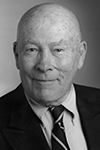 Dr. Carney was an advocate and ally in the fight for fair housing in Riverside after a study he designed showed racial discrimination in housing was a widespread problem in the city.
Dr. Carney was an advocate and ally in the fight for fair housing in Riverside after a study he designed showed racial discrimination in housing was a widespread problem in the city.
Robert Bland
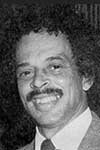 Bland led a parents’ movement to integrate Riverside schools after an arsonist burned Lowell School in 1965. Only three weeks after the Watts riots, the arson threatened the peace of the city but the group co-chaired by Bland was able to effectively negotiate with the school board for voluntary integration.
Bland led a parents’ movement to integrate Riverside schools after an arsonist burned Lowell School in 1965. Only three weeks after the Watts riots, the arson threatened the peace of the city but the group co-chaired by Bland was able to effectively negotiate with the school board for voluntary integration.
Arthur L. Littleworth
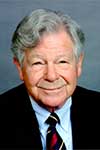 As president of the Riverside Unified School District board, Littleworth led the school board through community turmoil to work with parents and local leaders to develop a plan for and approve voluntary integration of Riverside schools in 1965, the first large school district in the nation to do so.
As president of the Riverside Unified School District board, Littleworth led the school board through community turmoil to work with parents and local leaders to develop a plan for and approve voluntary integration of Riverside schools in 1965, the first large school district in the nation to do so.
Edna Burkett Milan
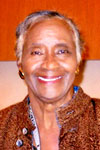 Edna B. Milan, veteran of the civil rights movement, is a native of Montgomery, Alabama. Educated in the segregated Atlanta, Georgia public school system, she gained a Christian foundation as a member of Martin Luther King, Jr.’s Ebenezer Baptist Church. Recruited as a teacher by Riverside Unified School District, Mrs. Milan was instrumental in implementing voluntary integration, leading to development of a national integration model for schools.
Edna B. Milan, veteran of the civil rights movement, is a native of Montgomery, Alabama. Educated in the segregated Atlanta, Georgia public school system, she gained a Christian foundation as a member of Martin Luther King, Jr.’s Ebenezer Baptist Church. Recruited as a teacher by Riverside Unified School District, Mrs. Milan was instrumental in implementing voluntary integration, leading to development of a national integration model for schools.
Lulamae Clemons
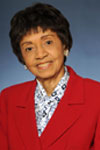 Nurse, public health leader, and equal education pioneer, Dr. Clemons led the federally funded University of California Title IV Schools Desegregation Project in four western states.
Nurse, public health leader, and equal education pioneer, Dr. Clemons led the federally funded University of California Title IV Schools Desegregation Project in four western states.
Rupert Costo
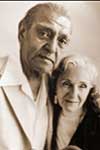 Rupert Costo was a member of the California Indian Rights Association (1930s) and lobbied for the creation of UCR (1950s). A Cahuilla tribal leader for decades, he was a tireless advocate for Native American land rights. He founded the American Indian Historical Society and his books explored Native American history under the mission system and the U.S. government.
Rupert Costo was a member of the California Indian Rights Association (1930s) and lobbied for the creation of UCR (1950s). A Cahuilla tribal leader for decades, he was a tireless advocate for Native American land rights. He founded the American Indian Historical Society and his books explored Native American history under the mission system and the U.S. government.
Howard H “Tim” Hays, Jr.
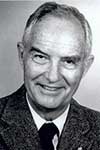 Under Hays’ leadership, The Press-Enterprise exposed theft of Agua Caliente funds by conservators, including a judge who tried to have Hays arrested. The series won the 1968 Pulitzer gold medal for Meritorious Public Service. In 1984 and 1986, Hays led the paper’s battle for open courtrooms, culminating in precedent-setting First Amendment rulings by the U.S. Supreme Court.
Under Hays’ leadership, The Press-Enterprise exposed theft of Agua Caliente funds by conservators, including a judge who tried to have Hays arrested. The series won the 1968 Pulitzer gold medal for Meritorious Public Service. In 1984 and 1986, Hays led the paper’s battle for open courtrooms, culminating in precedent-setting First Amendment rulings by the U.S. Supreme Court.
Tomàs Rivera
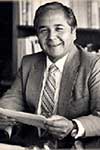 The son of migrant farm workers, Tomás Rivera grew up to be an educator, writer, and the chancellor of the University of California, Riverside in 1979. He was the first Mexican American chancellor at a University of California campus.
The son of migrant farm workers, Tomás Rivera grew up to be an educator, writer, and the chancellor of the University of California, Riverside in 1979. He was the first Mexican American chancellor at a University of California campus.
Jack Clarke, Sr.
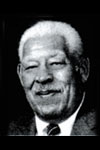 One of the first full-time African American professionals hired at the California Youth Authority, he was an affirmative action pioneer. In 1981, he was the first African American elected to the board of the Riverside County Office of Education, and in 1986 the first African American elected to the Riverside City Council.
One of the first full-time African American professionals hired at the California Youth Authority, he was an affirmative action pioneer. In 1981, he was the first African American elected to the board of the Riverside County Office of Education, and in 1986 the first African American elected to the Riverside City Council.
Richard M. Milanovich
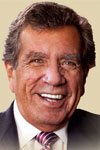 As tribal chair of the Agua Caliente Band of Cahuilla Indians, he crafted groundbreaking land use agreements with neighboring city and county governments that served as nationwide models. From 1996 to 2008, determined to forge a better tomorrow for future generations, he negotiated gaming compacts with two California governors and helped to win 1998, 2000, and 2008 ballot measures sanctioning tribal gaming.
As tribal chair of the Agua Caliente Band of Cahuilla Indians, he crafted groundbreaking land use agreements with neighboring city and county governments that served as nationwide models. From 1996 to 2008, determined to forge a better tomorrow for future generations, he negotiated gaming compacts with two California governors and helped to win 1998, 2000, and 2008 ballot measures sanctioning tribal gaming.
Clare J. Taber
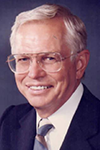 As a business owner and president of the Chamber of Commerce, Clare J. Taber championed equal employment rights and unionization and actively sought and recruited minority employees. He funded the establishment of the Riverside Urban League office and received the Vernon Jordan award in 1987-88 for his support of minority education, job training, and equal employment.
As a business owner and president of the Chamber of Commerce, Clare J. Taber championed equal employment rights and unionization and actively sought and recruited minority employees. He funded the establishment of the Riverside Urban League office and received the Vernon Jordan award in 1987-88 for his support of minority education, job training, and equal employment.
Justice Richard T. Fields
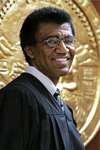 When he became a court commissioner in 1991, Richard Fields became the first African American jurist in Riverside County. In 2000, he became the first African American judge in Riverside County. From 2007–2008, he served as the Presiding Judge of the Riverside County Superior Court. In 2017, he was appointed to the 4th District Court of Appeal.
When he became a court commissioner in 1991, Richard Fields became the first African American jurist in Riverside County. In 2000, he became the first African American judge in Riverside County. From 2007–2008, he served as the Presiding Judge of the Riverside County Superior Court. In 2017, he was appointed to the 4th District Court of Appeal.
Kay Berryhill Smith and Carolyn Confer
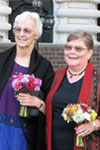 Carolyn Confer, as assistant city attorney for Riverside, represented the city in opposing a lawsuit that sought to force the city to put a discriminatory measure against homosexuals and persons with AIDS on the ballot in 1991. Kay and Carolyn founded PACE, a regional gay and lesbian political action committee.
Carolyn Confer, as assistant city attorney for Riverside, represented the city in opposing a lawsuit that sought to force the city to put a discriminatory measure against homosexuals and persons with AIDS on the ballot in 1991. Kay and Carolyn founded PACE, a regional gay and lesbian political action committee.
Rose Mayes
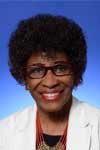 As a fair housing leader, Rose Mayes developed the Fair Housing Council of Riverside County into a national model for combating housing discrimination recognized by the Department of Housing and Urban Development and National Fair Housing Alliance. She is co-founder of the Civil Rights Institute of Inland Southern California.
As a fair housing leader, Rose Mayes developed the Fair Housing Council of Riverside County into a national model for combating housing discrimination recognized by the Department of Housing and Urban Development and National Fair Housing Alliance. She is co-founder of the Civil Rights Institute of Inland Southern California.
Judge Virginia A. Phillips
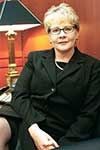 Judge Virginia A. Phillips ruled in Log Cabin Republicans v. United States of America that the ban on service by openly gay service members was an unconstitutional violation of the First and Fifth Amendments. She granted an immediate worldwide injunction prohibiting the Department of Defense from enforcing the “Don’t Ask, Don’t Tell” policy.
Judge Virginia A. Phillips ruled in Log Cabin Republicans v. United States of America that the ban on service by openly gay service members was an unconstitutional violation of the First and Fifth Amendments. She granted an immediate worldwide injunction prohibiting the Department of Defense from enforcing the “Don’t Ask, Don’t Tell” policy.
Juan Felipe Herrera
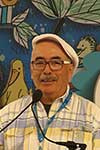 Born to migrant farmworker parents, in 2015 Juan Felipe became the first Latino to be named U.S. Poet Laureate, shortly after his retirement from the Tomás Rivera chair at the University of California, Riverside. His work focuses on civil rights themes and includes poetry, novels for young adults, and children’s books.
Born to migrant farmworker parents, in 2015 Juan Felipe became the first Latino to be named U.S. Poet Laureate, shortly after his retirement from the Tomás Rivera chair at the University of California, Riverside. His work focuses on civil rights themes and includes poetry, novels for young adults, and children’s books.
